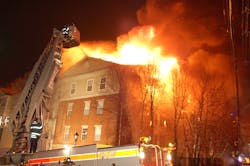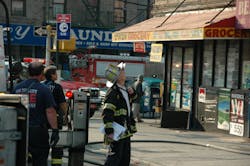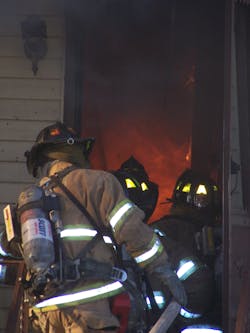A new location, a renewed vigor and an unwavering commitment make the 2021 edition of Firehouse Expo the event of the year for training and education. For those who are unable to attend, the following profiles of four educational sessions synopsize the kind of unique information from the Show that you can obtain at Firehouse.com and on social media using #FHExpo21.
The Contemporary Fire Problem: Lightweight Multi-Unit Residential Complexes
By John Lewis and Robert Moran
Large, lightweight, multi-unit residential housing complexes have become popular as communities strive to revitalize their downtown areas, expand housing stock and increase tax revenues. Although assumed to be a fire-safe living environment, these complexes create significant problems for responding firefighters during construction and when fully occupied. Simply stated, fire suppression operations in these complexes won’t be routine.
Several inherent construction methods and design elements negatively affect firefighter safety and support major fire problems. These include rapid-fire spread, high heat-release rates and early collapse. Additionally, communities are allowing these complexes to be built on small parcels of land. This can create acute exposure problems, deep setbacks, deficient building access and egress, variable building elevations and overhead obstructions.
Fire suppression operations in these large buildings require strict command and control and an extensive amount of staffing, apparatus and other resources. You shouldn’t hesitate to request all of these resources early in the incident.
At the end of the day, the key to a successful fire suppression operation in these buildings is proper preparation. Company site visits, department walk-throughs, code inspections and simulated responses to the location ensure that members are provided with the essential information for when the alarm sounds.
By Thomas Dunne
Firefighters perform a demanding job in a very stressful environment. A few basic concepts will help you to navigate your way through the pitfalls of that world.
Everyone feels this way. Realize that you aren’t the only one on the fireground who feels stressed. Most likely, that very competent-looking firefighter or chief also is experiencing it but might be masking it by actively trying to appear calm and under control. Sometimes a bit of acting is called for. If you act and communicate like you’re confident, you’ll make the people around you feel more at ease, which leads to a safer operation.
Be an optimist. You might not have the fire under control but focus on the things that you can control and be mindful of what you already accomplished. Concentrating on an individual, specific task might “reset” your brain from a state of nervous confusion to a place that allows you to attack the challenges in a series of gradual steps.
Accept the uncertainty. You often will work with inadequate knowledge about the extent of the fire, the particulars of the building or other key aspects of your initial size-up. Accept this uncertainty as a part of your work; don’t allow it to inhibit your decision-making.
Learning to function under stress is similar to cultivating your skills as a leader. Leaders aren’t born; they are developed. Performance is a learned skill, too.
By John R. Brophy
To achieve the most success in a first-due situation on the fireground, the engine crew, both individually and collectively, always must develop and maintain a state of readiness. This includes physical fitness, mental alertness, and remaining current on departmental procedures as well as firefighting knowledge and skills.
All members of the first-due engine crew must be able to quickly process critical information from a variety of sources and coordinate their efforts as a team. At the same time, the first-due engine crew must anticipate, understand, and adapt to both fire and human behavior. Critical factors for the first-due engine crew to consider include time of day and day of week; building construction; conditions on arrival; the intensity, speed and direction of travel of the fire; and survivability as it relates to both the occupants and the crew itself.
Most importantly, the first-due engine crew must know its strengths, weaknesses and limitations and match them against the prevailing conditions in their determination of offensive, defensive or transitional strategy. The last thing that a first-due engine crew should do is put itself in a situation in which there’s a high probability that it will become part of the problem instead of fulfilling its primary role as the start of the solution.
Searchable vs. Survivable: Educational Decision Making
By Sean Duffy
Civilians depend on us to decrease the amount of time that it takes to locate and remove them. For this reason, we must be intelligently aggressive and make decisions that are based on a solid foundation of core knowledge. Our thought process when arriving shouldn’t be that rescues might be possible but rather that they are probable. It’s imperative that we focus on a search size-up during our 360, because this way of thinking allows us to target the areas that give us the greatest chance at locating and rescuing victims. Generally, victims are found in very predictable areas, so it’s important that we use facts, not fear, to choose the appropriate course of action. This approach puts citizens first and increases their survivability rate. Knowledge, ability and time are all contributing factors on the fireground.
Remember, a fire doesn’t have to be large to be deadly. The longer that civilians are in there, the less likely that they are to survive the environment. We must consider the effect of fractional effective dose and what it means for our trapped occupants. Both temperature and toxic gas exposures play a vital role here.
Firehouse Staff
Content written and created by Firehouse Magazine editors.








